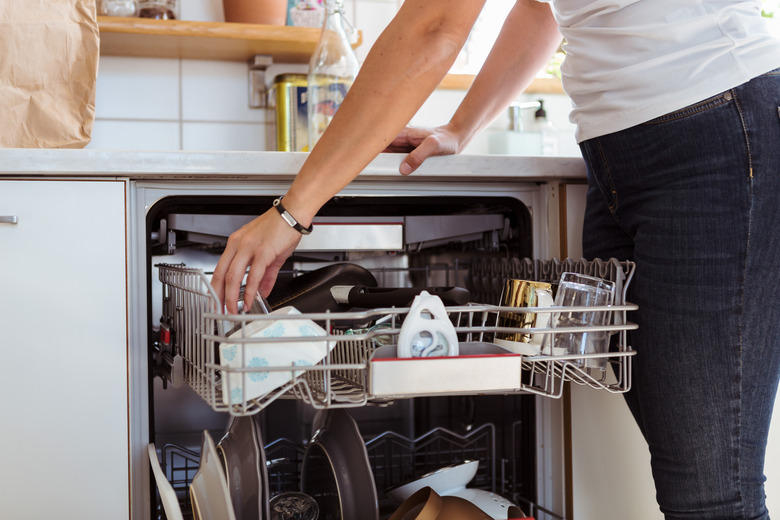How To Stop White Residue On Dishes From A Dishwasher
If you're in a love-hate relationship with your dishwasher, know that you're not alone. In theory, you should open your dishwasher after a cleaning cycle to reveal sparkling clean dishes and crystal clear glassware. In reality, however, these appliances often leave an unsightly white residue on your dishes, forcing you to wash your (supposedly) clean glasses a second time before company comes. Fortunately, there are several ways to solve the residue problem so you can get back to relaxing while the dishwasher does the work for you.
Hard Water Woes
Hard Water Woes
If you have hard water, filmy dishes are almost guaranteed. When running your dishwasher, some of the minerals from your water will likely stay behind on your dishes after a wash cycle. The problem will get worse as hard water deposits build up inside your dishwasher, adding extra minerals to the mix.
For an immediate fix, empty your dishwasher and start a wash cycle. Once the appliance has filled itself with water, open the door and add two cups of white vinegar to the water at the bottom of the appliance. Resume the wash cycle and let the vinegar wash away any mineral buildup. This should help get rid of white film on dishes in the dishwasher.
Over time, your hard water will add more deposits to the appliance, and you'll once again find your dishwasher leaving film on your dishes. You can clean the unit with vinegar again or solve the problem permanently by installing a water softener.
Get in Hot Water
Get in Hot Water
In order to properly dissolve and utilize dishwashing detergent, the water inside your dishwater needs to get hot. The optimal water temperature for most appliances is between 120 and 150 degrees Fahrenheit. If the water is too cold, the dishwasher leaves white residue behind in the form of undissolved soap. Check your hot water heater and make sure it's heating your water to the optimal temperature.
Even if your water heater is set properly, there's likely still quite a few feet of plumbing between the unit and your dishwasher. To make sure every cleaning cycle starts with the hottest water possible, run water through your kitchen faucet until it gets hot, and then start your dishwasher. This ensures the water in your pipes is hot and ready as soon as the dishwasher starts to fill.
Note that even the hottest water can only dilute so much soap. If your water is running hot but your dishes are still filmy, try halving the amount of dish detergent you use.
Dishwasher Leaving Gritty Residue
Dishwasher Leaving Gritty Residue
If the film left behind by your dishwasher feels gritty, there are two possible culprits. The first is undissolved detergent. This issue is most common with powdered detergent and dry detergent cakes. Washing the dishes by hand will remove the film. You can prevent future problems by making the water in your dishwasher hotter.
Etching, however, is a permanent problem. Etching occurs when tiny bits of soap powder scratch the dishes. If you run your fingernail down a cloudy glass and feel little divots or bumps, your dishwasher has permanently scratched the dish. Switching to a liquid detergent should solve the problem, but it won't undo any damage that's already occurred.
Use a Rinse Aid
Use a Rinse Aid
Although some skeptics remain, the fact is that rinse aids do help eliminate film in dishwashers. These chemicals help encourage water to run off the dishes to rinse them more efficiently. The more water runs off your dishes, the less there is to stay behind and leave white spots and residue when drying.
For even better results, use a rinse aid and a citric acid additive every time you run your dishwasher. Citric acid additives work in the same manner as vinegar, cleaning away hard water deposits and minerals. Simply add them to your detergent, and your dishwasher will get cleaned along with your film-free dishes.
